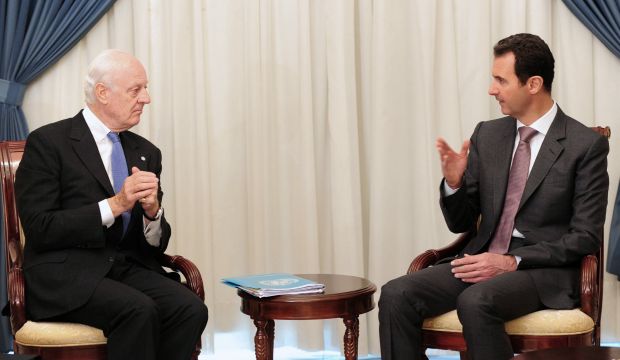A week ago, the UN’s envoy to Syria, Staffan de Mistura, defied everyone by insisting that Iran be invited to a proposed international conference on Syria, saying: “The United Nations and myself have the right and will be inviting everyone, including Iran.” Dear Mr. de Mistura, a question, if I may: Why invite Iran when it rejects the outcomes of the two previous Geneva conferences?
De Mistura justifies his position on Iran by using the excuse that it has influence on the ground in Syria. Well, since invitations are being distributed based on this principle, the United Nations might as well invite the Al-Nusra Front and the Islamic State of Iraq and Syria (ISIS), as these two terrorist groups are more influential on the ground than Iran and its allies.
After all these months since he was appointed in July, the international envoy has decided to impose Iran on the Syrians in Geneva. However, the war on the ground has not taken the path that he, Iran, or Syrian President Bashar Al-Assad had hoped for. The rebels have recently achieved a series of stunning victories, something they have not been able to achieve during the last two years of the conflict.
Assad’s forces have been defeated in Idlib, Jisr Al-Shughour and elsewhere, and the fighting is only some 25 miles (40 kilometers) from the city of Latakia, a government stronghold. The fear has been reflected in currency trading in the capital Damascus, where the Syrian pound has quickly declined in value from 260 to 300 Syrian pounds against the US dollar.
Of course, it is de Mistura’s right to invite whoever he wants to Geneva. However, he has more-or-less destroyed the conference before it has even convened, due to his inept management style and snobbish rhetoric.
He will not be successful in imposing a solution on the majority of Syrians just because he thinks Iran is influential in the war, since Tehran and the Syrian regime represent, at best, no more than 15 percent of the people. Even members of the Alawite sect to which Assad belongs have begun to profess their desire to get rid of the regime’s symbols.
The international envoy can do whatever he wants, but he will not be able to stop the fighting. He will fail just like the Russians did with their conference, which was only attended by Syrian government representatives and those affiliated with it.
De Mistura has spent most of his time with Assad, and has not given any attention to the opposition. And now he is proposing a conference that meets the needs of the Damascus regime. The question is, what can the conference hope to achieve if no acceptable ideas are put forward?
The participants at the two previous Geneva conferences reached a solution to form a government consisting of the opposition and the regime but without the latter’s leadership, something the Syrian regime did not agree to. This was a middle-ground solution that represents the upper limit in terms of concessions to the Assad regime. There is no point in holding another Geneva conference without accepting this basic principle.
The international envoy has nothing with which to threaten the opposition, as Iran has been present with all its force in Syria for the past two years, using its operatives in Lebanon, Iraq and Afghanistan to wreak havoc upon the war-torn country.
However, Tehran has not succeeded in achieving any kind of victory in Syria, unlike the opposition, which is fighting the Syrian regime and continually besieging its bases. The regime has nothing left with which to frighten the Syrian people: it has already displaced millions and murdered more than a quarter of a million, and yet the Syrians continue in their struggle.
